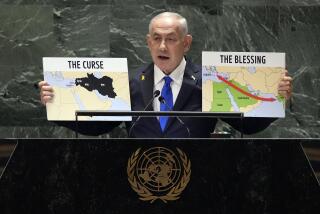Shamir Urges Rejection of PLO’s Call for Talks : Israel: The prime minister says his nation will support peace moves after the war--but on its own terms.
- Share via
TEL AVIV — Prime Minister Yitzhak Shamir denounced Palestine Liberation Organization leaders on Monday as “the biggest supporters of the murderer from Baghdad” and called on world opinion to reject the PLO’s urging for an international conference on peace in the Middle East.
In a speech to lawmakers on how the Persian Gulf conflict has affected Israel, Shamir said that when the war ends, Israel will support renewed moves toward an overall Mideast peace settlement--but only on its own terms.
“Today,” Shamir said, “it should be clear to everyone that ideas like an international conference, which are fervently supported by Saddam Hussein and (PLO Chairman) Yasser Arafat, are not the means for advancing an arrangement, but for imposing the will of the aggressor.”
The prime minister has consistently refused to negotiate with the PLO concerning the Israeli-occupied territories and has been opposed to any international peace conference, even if the United States were represented, that included PLO representation.
Shamir on Monday proposed a return to his peace initiative of May, 1989. In that plan, he called for municipal elections in the Israeli-occupied territories as a first step toward non-PLO representation of the Palestinians. The plan fizzled largely because of lack of Palestinian support.
Renewing his attacks on the Palestinian organization Monday, Shamir said: “As for the PLO, there is no need to discuss it at length. Arafat and his ilk are the biggest supporters of the murderer from Baghdad.”
Citing widespread Palestinian backing for Iraq, Israeli authorities have kept the occupied West Bank and Gaza Strip under curfew for the last three weeks, and residents complain of increasing difficulties getting food and the money to pay for it.
Defense Minister Moshe Arens acknowledged Monday that the curfew was creating “great suffering” for Arabs in the occupied territories, but added, “I hope they understand that the man who has caused them this damage is Saddam Hussein.”
Arens said that he had discussed the curfew with several Palestinian mayors, and that it was being eased in places, but indicated it would not be lifted soon.
“It depends on what happens in the field,” he said.
Israeli army spokesman Nachman Shai said that stores in the occupied territories were staying open longer and that banks had opened as well. Along with its protracted duration, the curfew is causing even more hardships on the Palestinians because they are allowed out of their homes for just brief periods during the day for shopping and other essential movement. Schools remain closed during the curfew.
Shai denied that there were any shortages of food, even though the United Nations Relief and Works Agency has begun distributing flour to needy Palestinians in response to growing concern about hunger.
He said the curfew would stay in force because the threat still exists that Palestinians may try “either terrorist activities or demonstrations and parades.”
Shai also said he was concerned that if Palestinians who work in Israel proper were allowed back to their jobs and happened to be in the country during an Iraqi missile attack, Israelis’ reaction during or after the attack might prove dangerous.
And when it becomes clear to Palestinians that Iraq has lost the war, he added, “that will upset them very much,” possibly triggering more violence.
Israeli politicians spanning the spectrum from peace activists to hawks have said they were shocked by accounts of Palestinians cheering as Iraqi missiles fell on Tel Aviv. They said they expected such displays to cut into the support, in Israel and abroad, that Palestinians had in their goal of achieving a territorial compromise from the Jewish state.
More to Read
Sign up for Essential California
The most important California stories and recommendations in your inbox every morning.
You may occasionally receive promotional content from the Los Angeles Times.













